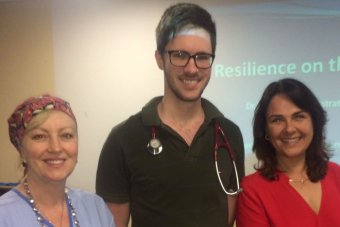A central Queensland hospital is leading the way in helping junior doctors cope with high levels of stress and anxiety.
The Australian Medical Association (AMA) of Queensland has launched the Resilience on the Run pilot program in Rockhampton in the hope it could soon be rolled out across the country.
Psychiatrist Ira van der Steenstraten said the four-week course taught junior doctors to recognise the emotional fatigue and pressures associated with the job.
“In the medical profession you deal with a lot of stresses,” Dr van der Steenstraten said.
“You work long hours, night shifts, you have to deal with really complex problems, even have to deal with situations that might traumatise yourself … and this can have real negative mental health impacts if you don’t have the necessary coping mechanisms.
“We’re very good at taking care of others but a lot of them are not so good at taking care of themselves, and that really is what this program is all about – really to teach them to take care of themselves otherwise you can’t take care of others.”
A recent Beyond Blue survey showed one in four Australian doctors had suicidal thoughts, and 2 per cent of doctors had attempted suicide.
‘It can be difficult to put up your hand and say you’re struggling’
Aliastair Quinn, a first year doctor at the Rockhampton Base Hospital, said the transition from university to hospital could be difficult.
“Suddenly you’re expected to know so much and you’re expected to have clinical judgement, your advice becomes medical advice and as a result it can be very stressful,” he said.
Junior doctors are under a lot of stress and a lot of pressure and I think we need to realise that we’re humans.
Aliastair Quinn, first year doctor at Rockhampton Base Hospital
“We have high standards we expect of ourselves and our profession that we will be caring and kind but also professional and knowledgeable and sometimes those standards can be very difficult to live up to.”
Dr Quinn said taking part in Resilience on the Run had already helped him.
“We’re so used to giving advice that sometimes it can be difficult to receive it, and sometimes it can be difficult to put up your hand and say you’re struggling … junior doctors are under a lot of stress and a lot of pressure and I think we need to realise that we’re humans.”
Rockhampton clinical training director Annette Turley welcomed the project but said it could be rolled out even further.
“I think it gets harder for senior doctors to put their hand up and say they’re felling burnout and fatigue and so having something available that would take them through some skills testing and learning would be useful for them as well,” Dr Turley said.
“We all get overwhelmed with the emotional aspects of people’s health.
“It’s often a difficult job you’re telling people what they don’t want to hear and you don’t want to say.
“There’s a lot of evidence about compassion fatigue in the medical community at the moment, where the long hours, the number of patients going through that are sick and utilise your emotions or trigger emotions within you can drain you and you get burnout.”

